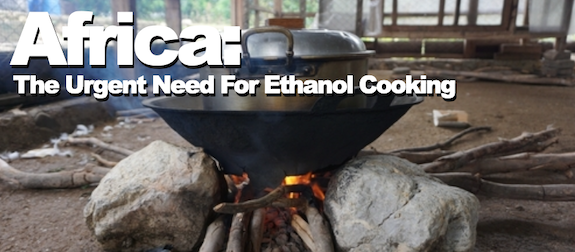The Urgent Need For Ethanol Cooking In Africa

By Douglas L. Faulkner, “The Cleantech Conservative” and Gerard J. Ostheimer, PhD
Special to the Digest

Douglas L. Faulkner, “The Cleantech Conservative”

Gerard Ostheimer, PhD, manager, Clean Energy Ministerial Biofuture Campaign
We have argued in the Digest that bio-based fuels, chemicals, and materials ought to be a cornerstone of the modern African economy. In addition, we recently assisted the Atlantic Council to envision what it is needed for “Building a Biofuels Industry in Africa”. Biofuels Digest readers can readily anticipate the benefits of a vigorous African bioeconomy: more and better rural jobs, a cleaner environment, and improved agricultural productivity for greater food and energy security. The pressing question becomes where to start for the biggest, fastest bang for the proverbial buck. We believe the answer is to replace cooking with dirty, smoky charcoal, wood, and kerosene with clean ethanol cooking. Changing that basic element of everyday life would literally save millions of lives and set the stage for Africa to meet its future needs for food, feed, and fuel.
Countries in sub-Saharan Africa face many challenges, but to kickstart African biofuel production and use, we believe that household cooking is the most urgent task and greatest opportunity for the African bioeconomy. According to the International Energy Agency, “The reliance of the vast majority of sub-Saharan Africans on gathering or purchasing biomass for cooking, particularly in rural areas, dramatically damages health and impairs productivity. Almost 490 000 premature deaths per year are linked to household air pollution from the lack of access to clean cooking facilities, with women and children being the worst affected. The unsustainable harvesting of fuelwood also contributes to de-forestation.”
The shocking reality is that most Africans cook over open fires in both rural and urban settings. Whether fueled by charcoal, wood, or kerosene, the simple act of cooking causes unhealthy levels of indoor air pollution that drive illness and the aforementioned premature deaths. The harvest of wood and preparation of charcoal is driving de-forestation in countries like the Democratic Republic of Congo and Tanzania.
Why the Urgency?
As described in the “Tracking SDG 7: The Energy Progress Report, 2023” prepared by the International Energy Agency (IEA), International Renewable Energy Agency (IRENA), UN Statistics Division, World Bank, and the World Health Organization (WHO), sub-Saharan Africa is not making progress on Sustainable Energy Goal 7, which seeks to “ensure access to affordable, reliable, sustainable, and modern energy for all”. Access to clean cooking fuels is actually worsening by several measures, particularly in sub-Saharan Africa:
- Worldwide, 675 million people are without electricity and a staggering 2.3 billion people still rely on dirty fuels to cook their everyday meals.
- Pollution from dirty cooking contributes to 3 million people dying prematurely each year.
- Some progress is being made on using renewables for power generation, but sub-Saharan Africa is ground zero for energy, food, and environmental insecurity.
- Over a half billion sub-Saharan Africans are without electricity and over 80% rely on traditional biomass, i.e., charcoal, wood, and kerosene, for cooking, and the region is falling further behind in achieving the fundamental SDG7 energy access goal of clean-cooking solutions for all.
The damage to human health, gender inequalities, tropical forests that are home to some of the world’s most endangered animals, and national prosperity in those regions is accelerating, even so, international financial flows have slowed appreciably. Slowing – then reversing – these trends for millions of people should be of singular importance.
Next Steps: Building Better Business Conditions for Ethanol Cooking
Let’s be perfectly clear. Sustainable ethanol is far cleaner, safer, and convenient for consumers than either charcoal, wood, or kerosene. We contend that G20 governments should make cleaning up dirty African cooking a much higher priority for their assistance programs. These wealthy countries must press for ethanol to be a major component of that shift. This means that many governments (especially in the EU) will have to move beyond their current reluctance to embrace and promote sustainably produced ethanol.
For Africa, unlike India or China, widespread electrification of cooking or even greater use of liquid fossil fuels is unrealistic and impractical over the next 5 – 10 years. In contrast, as shown by KOKO Networksethanol is a viable solution today and requires minimal interventions by either donor or recipient governments. Together with its allies, the U.S. should immediately help sub-Saharan countries remove barriers to increased use of ethanol for cooking while also building capacity in sub-Saharan countries for ethanol distribution and production.
What encourages our urgent call for action is recent progress in developing African ethanol markets. Based on the experience of the Clean Cooking Alliance, KOKO Networks, Pivot, Project Gaia, UNIDO, and U.S. Grains Council, we conclude that African political leaders can help develop ethanol markets by reducing the luxury tax on ethanol and the duties on ethanol imports. By taking these steps the Government of Kenya sparked the rapid growth of a vibrant ethanol cooking market in Nairobi and its outskirts. It appears that Rwanda will follow suit.
To help scale up African ethanol markets, Development Finance Institutions (e.g., Word Bank), donor governments, and philanthropic foundations should:
- Focus on building the necessary infrastructure, like improved ports, roads, and railroads, and on supporting agricultural modernization through locally focused research and development, as is advocated by Bjorn Lomborg and the Copenhagen Consensus.
- Ensure that any new major global aid program, as was discussed at the recent Summit for a New Global Financing Pact and will be discussed at the UN SDG Summit in September and COP28 in December, provide targeted support for ethanol clean cooking.
Learning from America and Brazil
The American bioeconomy was kickstarted by the scale-up of corn ethanol production to offset rapidly rising oil imports and benefit rural communities. Likewise, Brazil’s experience with sugar cane ethanol enabled the transition from being a food importer to agricultural powerhouse that it is today. Recently, India has drastically increased its ethanol production. Learning to produce ethanol at scale made America, Brazil, and soon India, better at managing feedstock supply chains, optimizing the use of feedstocks to produce multiple revenue streams, and opening pathways to new generations of biofuels and bio-based products. America and Brazil now have a well-trained workforce that is ready to broaden and deepen the role of industrial biotechnology in our economies.
Africa should adapt those successes with ethanol to its own conditions in its own way. Ethanol-based cleaner cooking can set the stage for a broader, more prosperous continental bioeconomy, so that Kenya, Uganda, Tanzania, or Mozambique can each become an “Iowa of Africa.”
Category: Top Stories















